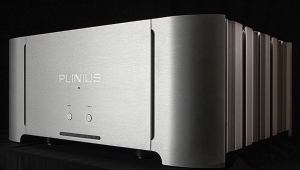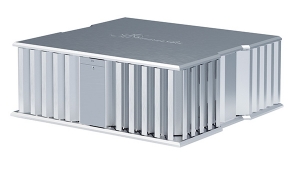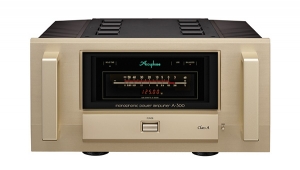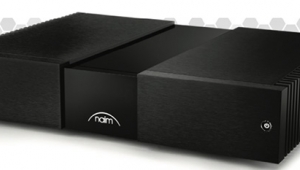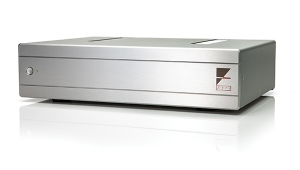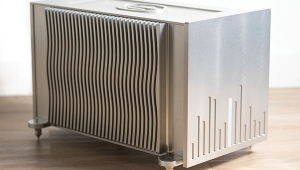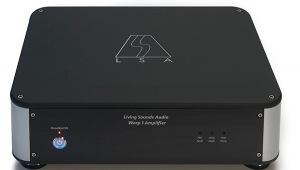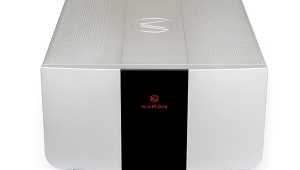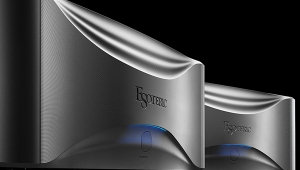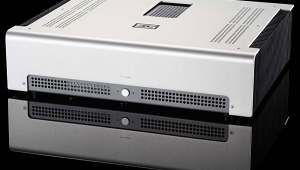| Columns Retired Columns & Blogs |
Soulution 710 power amplifier Page 2
Soulution pulls a fast one
But superb measurements don't always yield superb sound. Amplifiers designed to produce vanishingly low distortion can sound cold and uninvolving. That's how I felt about the Halcros. There was no there there.
But superb measurements don't always yield superb sound. Amplifiers designed to produce vanishingly low distortion can sound cold and uninvolving. That's how I felt about the Halcros. There was no there there.
While the Soulution 710's sound won't appeal to everyone, as demonstrated by the reaction of a few visitors here, it will appeal to anyone who values unparalleled transparency, startling transient cleanness, and a level of overall refinement that easily surpassed that of any other amplifier I have heard. The 710 gripped my Wilson Audio MAXX 3 speakers as has no other amplifier in my experience, acting and reacting with effervescent speed. A few visitors were reminded of Spectral's overall sound, but I have no experience there.
Usually, the tradeoff in transients is between fast and sharp or slow and smooth, with the former usually becoming edge and etch, the latter soft and boring—a choice between wet blanket and blocks of carved ice. Settling on something usually requires making sonic peace with one side or the other.
Yet the 710 was faster and smoother, and faster and sharper, and just plain fast. I thought I'd break it in and get acquainted by playing tracks from the Sooloos server using the Playback Designs DAC, expecting the Soulution to sound at first sharp and perhaps a bit ragged. Instead, it immediately seemed to transform "Red Book" CDs, producing an unusual serenity based on the opposite of soft and smooth, and an equally unusual (for me) sense of musical engagement caused by heightened transient clarity and speed—the kind that usually produces a tradeoff resulting in etch and edge, of which there was neither. The speed with which the 710 handled the entire audioband (never mind to DC, and to infinity and beyond) seemed constant, producing a heightened sense of coherent wholeness that felt like a stream of rapidly moving pulses, with no lag time or residue between events.
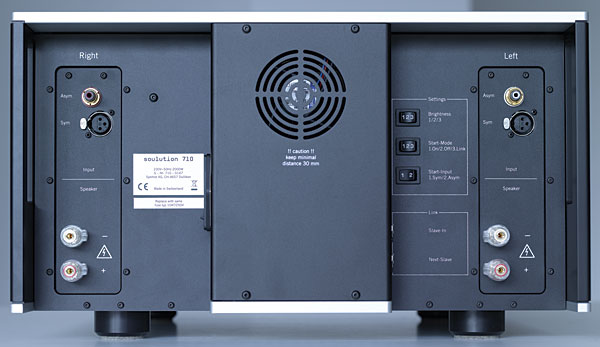
Put all of that together and I heard, from "Red Book" CDs, background blackness, three-dimensionality, image solidity, and diminishment of grain and smear that left me wondering whether some of my griping about "Red Book" CD was really about the inability of slower, less coherent electronics to keep up with the signal.
Until I started playing LPs. I've made it a mission to promote the soundtrack album for Wretches and Jabberers (CD, Rumor Mill BNC 78044), a documentary about autism. The film follows two adults with severe autism who, when very young, were misdiagnosed as being severely retarded. As adults they learned to type, and the world was opened to them. They now travel the world promoting the message that communication is the key to unlocking autism's mysteries.
The songs, written or cowritten and produced by Josh Ralph, include collaborations with Carly Simon, Stephen Stills, Ben Harper, Bob Weir, Norah Jones, Judy Collins, Devendra Banhart, Martin Carthy, and others. They're impeccably recorded at 24-bit/96kHz resolution, and produced with the audiophile values of space, dimensionality, and tonal purity.
But despite the star power, the beauty of the sound, the quality of the writing, and the value of the cause (a percentage of revenue goes to an autism foundation), no record label, minor or major, would release Wretches & Jabberers. So McIntosh Laboratories paid for impeccably produced sets of two 180gm LPs (mastered by Bob Ludwig and Bernie Grundman and pressed a RTI) and one CD. It's available in a limited edition from the usual online suspects.
I had felt the CD to be a coarse, milky cousin of the refined-, pristine-, and three-dimensional–sounding LP—but when I played the CD through the Soulution 710, it reminded me of the LP's transparency, three-dimensionality, blackness of backgrounds, and overall drop-your-shoulders relaxation.
The first LP I listened to through the Soulution was also Wretches & Jabberers, immediately after I'd sampled tracks from the CD. The LP still beat the CD, and by about the same amount, but only because it, too, was equally improved compared to my reference Musical Fidelity Titan power amp (which is plenty good, by the way, and way more powerful for less money). But in comparison, the Titan sounds warm and inviting, and less detailed and exciting. The 710 drew images that were finer, faster, purer, and more transparent than I'd become accustomed to hearing from this LP. Musical events exploded and then evaporated, leaving no residue.
Subsequent spins of the Wretches & Jabberers LP using the Classé CA-M600 monoblocks and the Music Reference RM-200 Mk.II tube amp proved the worths of the recording's engineering and production, and of the quality of the electronics used to play it. While both the Musical Fidelity and the Music Reference had considerable strengths, neither could touch the 710's speed, purity, transparency, three-dimensionality, and "black" backdrops. In terms of the portrayal of musical events minus tacked-on "electronica," the 710 topped anything else I'd heard.
Henry Mancini's main title music for the Paris caper Charade, starring Audrey Hepburn and Cary Grant, features a wood block in the left channel, a drum kit at the center, and bongos on the right. Over that rhythm track Mancini lays electric guitar (center), French horns and accordion (right), and trumpets (left), with plenty of space between them. It's a great 1963 recording made at RCA Hollywood. The JVC XRCD edition sounds voluminous until you play the original LP (RCA Living Stereo LSP-2755, a Dynagroove pressing that mostly escapes that format's evil consequences) or the Speakers Corner reissue. The Soulution 710's rendering showed off all of its strengths: lightning-fast attacks, long and graceful decays, black backdrops, freedom from electronic artifacts, and rhythm'n'pacing up the wazoo (sorry to get technical on you). If those are what you value in reproduced music, the 710 delivered them better than anything else I've heard.
- Log in or register to post comments




